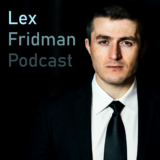Ben Shapiro is a conservative political commentator, host of The Ben Shapiro Show, co-founder of The Daily Wire, and author of The Authoritarian Moment and ...
Matthew Cox is a former con man who served 13 years in federal prison for bank fraud, mortgage fraud, and identity theft. He is the author of many books, ...
Tal Wilkenfeld is a singer-songwriter, bassist, and guitarist. She has performed with legendary artists including Jeff Beck, Prince, Incubus, Eric Clapton, ...
Guillaume Verdon (aka Beff Jezos on Twitter) is a physicist, quantum computing researcher, and founder of e/acc (effective accelerationism) movement. Please ...
Teddy Atlas is boxing trainer to 18 world champions, ESPN boxing commentator, and host of podcast THE FIGHT with Teddy Atlas. Please support this podcast by ...
Jeff Bezos is the founder of Amazon and Blue Origin. Thank you for listening ❤ Please support this podcast by checking out our sponsors: – Notion: ...
Lee Cronin is a chemist at University of Glasgow. Please support this podcast by checking out our sponsors: – NetSuite: http://netsuite.com/lex to get ...
Lisa Randall is a theoretical physicist at Harvard. Please support this podcast by checking out our sponsors: – Babbel: https://babbel.com/lexpod and use ...
Michael Malice is a political thinker, podcaster, author, and anarchist. Please support this podcast by checking out our sponsors: – Policygenius: ...
John Mearsheimer is an international relations scholar at University of Chicago. He is one of the most influential and controversial thinkers in the world on ...
Elon Musk is CEO of X, xAI, SpaceX, Tesla, Neuralink, and The Boring Company. Thank you for listening ❤ Please support this podcast by checking out our ...
Jared Kushner is a former Senior Advisor to President Donald Trump and author of Breaking History. Please support this podcast by checking out our sponsors: ...
Mark Zuckerberg is CEO of Meta. Please support this podcast by checking out our sponsors: – LMNT: https://drinkLMNT.com/lex to get free sample pack ...
Greg Lukianoff is a free speech advocate, first-amendment attorney, president of FIRE – Foundation for Individual Rights and Expression, and co-author of ...
James Sexton is a divorce attorney and author. Please support this podcast by checking out our sponsors: – Eight Sleep: https://www.eightsleep.com/lex to ...
Walter Isaacson is an author of biographies on Elon Musk, Steve Jobs, Einstein, Benjamin Franklin, Leonardo da Vinci, and many others. Please support this ...
Neri Oxman is a designer, engineer, scientist, and artist working on computational design, synthetic biology and digital fabrication, previously at MIT, and ...
Andrew Huberman is a neuroscientist at Stanford and host of the Huberman Lab Podcast. Please support this podcast by checking out our sponsors: – ...
Joscha Bach is a cognitive scientist, AI researcher, and philosopher. Please support this podcast by checking out our sponsors: – Numerai: ...
Mohammed El-Kurd is a Palestinian writer and poet. Please support this podcast by checking out our sponsors: – Factor: https://factormeals.com/lex50 and ...
- « Previous Page
- 1
- …
- 3
- 4
- 5
- 6
- 7
- …
- 22
- Next Page »

